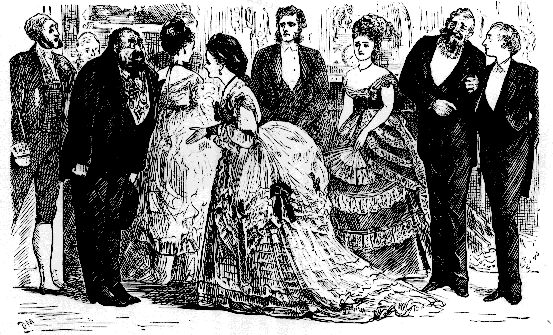Punch's Almanack provides a rich source of social commentary that sheds light on the characters in Anthony Trollope's The Way We Live Now. For example in volume 67 (1872) one of the regularly serialized cartoons, "The Ruling Passion," shows a scene at a party:

Two men discuss a foreigner showing off his medals to a woman across the room. Mr. Snobley Choddson says to Lord Algernon Fitzrad, "See my distinguished friend, my Lord! He's as proud of all those crosses and medals as -- as -- as -- " Fitzrad finishes Choddson's sentence for him saying, under his breath, "As you are of getting me to come and dine with you Mr. Snobley." This caustic statement captures a truth about social snobbery, making this particular cartoon humorous in the light of the society of the time. The writers of the Almanack satirize many aspects of their world, both social and otherwise. Clearly, Trollope portrayed Victorian culture in the mocking spirit of Punch and incorporated them into The Way We Live Now. [For another discussion of this cartoon.]
Issues of position in society spring up on nearly every page of the novel. Many of the characters are completely dominated by society's view of them. Trollope shows how this class system permeates all levels of society. Lady Carbury's writing endeavors provide an example of social position dominating even the most trivial actions. Trollope portrays Lady Carbury as a woman determined to succeed in writing by her social connections, rather than by truly being skillful. The author uses the publishing world as a paradigm for the social class structure. Just as Lady Carbury manages to publish a novel or two without any real talent, so can her thoughtless and selfish son, Felix, have a chance to succeed in marrying for money due to his title of Baronet.
Trollope's discussion of position in society ranges widely, from matters of such little gravity as Lady Carbury's writing to much more explicit happenings related to actual social class structure. Georgiana Longstaffe suffers complete humiliation in public circles simply because she associates with less-respected people. Her father's monetary troubles force the family to stay away from London for the entire year. Georgiana, fearing she will never find a husband in the country, fights to stay with anyone in town and ends up living with the Melmottes. As everyone comes to see Melmotte as a swindler, his family loses the high place in society that money bought them and Georgiana sinks along with them. Her brother points out “everybody doesn't make themselves part of the family. I have heard of nobody doing it except you. I thought you used to think so much of yourself...I can tell you nobody else will think much of you if you remain here” (I, 237).
As the cartoon in Punch illustrates, society emphasizes position and reputation above almost anything. Here, Trollope comments in a similar way, showing how snobbery turns a brother against his own sister. Later on, Georgiana suffers cruel treatment by one of her dearest friends because of her living arrangement. Lady Monogram responds condescendingly when Georgiana questions why her friend had not invited her to her house:
Of course you would have been asked if you had been up in Bruton Street.
You know that as well as I do...But the people in a house make a great deal of difference. I don't want to quarrel with you my dear; but I can't know the Melmottes. [I, 30]
Georgiana finds similar reproaches everywhere, including her formerly admiring mother and sister; her feeling of nobility crumbles along with her social status.
Throughout the novel, Trollope uses the Melmottes as the central figures in his exploration of social climbs and falls. Melmotte's wish to marry his daughter Marie to nobility in exchange for a handsome money reward provides one of the more evident examples of this. In Trollope's words, Melmotte's "daughter was valuable to him because she might make him the father-in-law of a Marquis or an Earl; but the higher he rose without such assistance, the less need had he of his daughter's aid" (I, 233). When Felix comes to Melmotte to ask for permission to marry his daughter, Melmotte's main question is whether Felix is, in fact, a Baronet. Melmotte would have forbidden such a union without any gain in class level. And yet, the more powerful Melmotte becomes because of his money, the more he comes to feel noble in his own right. The men around him notice him even lacking civility to earls and dukes at one point.
Melmotte's party elaborates on the theme of position and, in addition, allows the reader to see a more encompassing view of the societal pressure to respond to wealth and reputation as the symbols of the upper class. The Punch cartoon strongly illustrates the importance of class structure in Trollope's work. Just as Lord Fitzrad accuses Mr. Choddson of being overly honored by his presence, so is Melmotte puffed up by the appearance of the Prince, the Emperor of China and various other members of English nobility. Because of the prestige of these members of society, tickets to the dinner sell at astonishing rates. But when the rumor spreads that Melmotte forged a signature in a business matter, a dilemma arises. Trollope writes of Lady Monogram's thoughts before the party:
She cared nothing for Melmotte's villainy, as regarded herself...But it would grieve her greatly to become known as one of an awkward squad of people who had driven to the door, and perhaps been admitted to some wretched gathering of wretched people, -- and not, after all, to have met the Emperor and the Prince. (Vol. 2, 99-100)
The party thus becomes a complete social gamble. Those who go take a risk of being associated with the wrong crowd, while those who do not may have lost the chance to eat among the most noble and prestigious of gatherings possible.
<
Last modified 1996